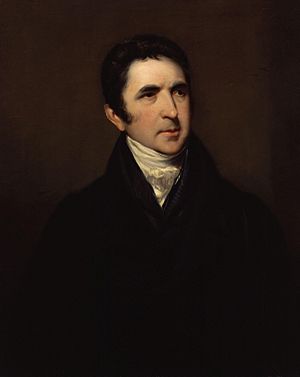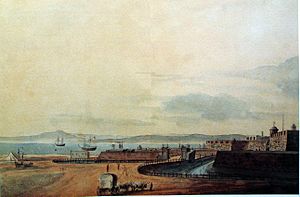Sir John Barrow, 1st Baronet facts for kids
Quick facts for kids
Sir
John Barrow
|
|
|---|---|

Barrow around 1810
|
|
| Second Secretary to the Admiralty | |
| In office 22 May 1804 – 28 April 1845 |
|
| Preceded by | Benjamin Tucker |
| Succeeded by | William Baillie-Hamilton |
| Personal details | |
| Born | 19 June 1764 Dragley Beck, Ulverston, Lancashire, England |
| Died | 23 November 1848 (aged 84) London, Middlesex, England |
| Spouse |
Anna Maria Truter
(m. 1799) |
| Children |
|
| Occupation | Geographer, linguist, writer |
Sir John Barrow (born June 19, 1764 – died November 23, 1848) was an important English geographer, linguist, and writer. He was also a civil servant, which means he worked for the government. He is most famous for his long time as the Second Secretary to the Admiralty from 1804 to 1845. The Admiralty was the part of the British government that managed the navy.
Contents
Early Life and Learning
John Barrow was born in a small village called Dragley Beck in Lancashire, England. He was the only child of Roger Barrow, who worked with leather. John went to Town Bank Grammar School in Ulverston.
When he was only 13, he left school to start a Sunday school for poor children in his area. This shows he cared about helping others learn from a young age. Later, he worked as a clerk at an iron factory in Liverpool.
At 16, John went on an exciting trip to Greenland to see whaling. In his twenties, he taught mathematics at a private school in Greenwich. He was always very good at math.
Adventures in China
In 1792, John Barrow joined the first British embassy (a special group of representatives) to China. He went with Lord Macartney as the person in charge of the household. This trip lasted until 1794.
Barrow quickly learned the Chinese language. He later wrote articles about China for a magazine called the Quarterly Review. He also helped Sir George Staunton write a book about the embassy, sharing many of his valuable ideas about China.
Even after the embassy returned, Barrow remained interested in China. The British government often asked for his advice on Chinese matters. Some historians believe Barrow thought China was a very old and advanced country that had started to decline by the time Europeans arrived.
Exploring South Africa
In 1797, Barrow traveled to the Cape of Good Hope in South Africa with Lord Macartney. This area was a new British colony. Barrow's job was to help bring together the Dutch settlers (called Boers) and the local Black people. He also had to explore and report on the country's interior.
During his journey, he visited many parts of the colony. When he came back, he was put in charge of checking public accounts. He even decided to live in South Africa, got married, and bought a house in 1800. However, Britain gave the colony back to the Dutch in 1802, which changed his plans.
Barrow took many notes and drew sketches during his travels in South Africa. He used these to create a map, which was the first modern map of the southern Cape Colony. His writings greatly influenced how Europeans understood South Africa and its people. However, some people, like William John Burchell, thought his map was not very good.
Working at the Admiralty
In 1804, Barrow returned to Britain and got a very important job: Second Secretary to the Admiralty. He held this position for 40 years! This was a long time to be in such a high government role.
He was so good at his job that when a new government came into power in 1830, the Prime Minister, Lord Grey, specifically asked him to stay. This helped start the idea that important government workers should stay in their jobs even when political leaders change. His role was even renamed Permanent Secretary.
Barrow was highly respected by all the leaders of the Admiralty and even by King William IV.
Supporting Arctic Exploration
One of Barrow's biggest interests at the Admiralty was promoting Arctic voyages. He strongly supported expeditions to explore the Arctic, including those led by John Ross, William Edward Parry, James Clark Ross, and John Franklin. These trips aimed to find new routes and discover unknown lands.
Many places in the Arctic are named after him, like the Barrow Strait in Canada and Point Barrow and the city of Barrow in Alaska.
Barrow was also a member of the Royal Society, a group of important scientists. He received an honorary degree from the University of Edinburgh in 1821. In 1835, he was given the title of Baronet by Sir Robert Peel, which is a special honor.
Later Life and Impact
Barrow retired from his government job in 1845. After retiring, he spent his time writing. He wrote a history of modern Arctic voyages in 1846 and his own life story (autobiography) in 1847. He passed away suddenly on November 23, 1848.
A monument called the Hoad Monument was built in his honor in 1850. It stands on Hoad Hill, overlooking his hometown of Ulverston. Some places in Australia, like Mount Barrow and Barrow Island, are also believed to be named after him.
People have different opinions about Barrow's legacy. Some historians say he helped promote the idea of imperialism, seeing Africa only for its resources. Others believe he supported humanitarianism and rights for South Africans. His strong push for Arctic voyages, especially searching for the Northwest Passage, has also been debated.
Family Life
John Barrow married Anna Maria Truter in South Africa on August 26, 1799. Anna Maria was an artist who drew plants. They had four sons and two daughters. One of their daughters, Johanna, married the artist Robert Batty.
His oldest son, George, inherited his father's title. Another son, John Barrow (1808–1898), became the head of the Admiralty Records Office. He created a system for keeping naval letters and saved old documents. He also wrote books about his travels and biographies of famous explorers like Francis Drake and Captain Cook.
Images for kids



